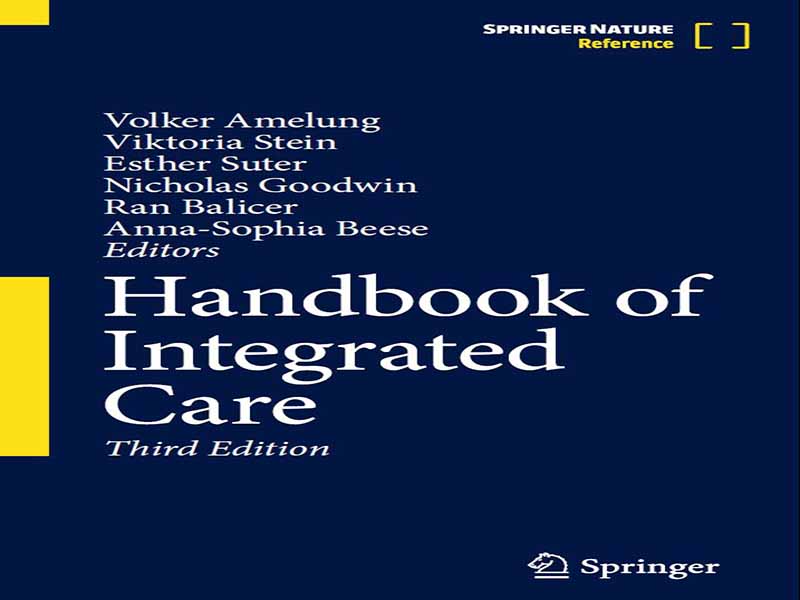- عنوان کتاب: Handbook of Integrated Care, Third Edition
- نویسنده: Volker Amelung, Viktoria Stein, Esther Suter
- حوزه: مراقبت پزشکی
- سال انتشار: 2025
- تعداد صفحه: 1680
- زبان اصلی: انگلیسی
- نوع فایل: pdf
- حجم فایل: 18.7 مگابایت
تنها ۳ سال از انتشار ویرایش دوم ما میگذرد، اما چشمانداز سلامت و مراقبت با سرعتی بیسابقه در حال تکامل است. تحقیقات جدید، تغییر اولویتهای سیاستگذاری و فناوریهای متحولکننده، همگی برای تغییر شکل نحوه درک و اجرای مراقبت یکپارچه، همگرا شدهاند. در این ویرایش سوم، ما بر پایههای بنا شده در جلدهای قبلی بنا نهادهایم تا شکافهای تازه در نظریه، عمل و استراتژی را پر کنیم، از جمله: • مدیریت سلامت جمعیت از حاشیه به مرکز دستور کار هر سیستم بهداشتی منتقل شده است. دیگر نمیتوانیم افراد را به صورت جداگانه درمان کنیم؛ باید نیازهای کل جوامع را پیشبینی و برطرف کنیم. این ویرایش با در هم آمیختن رویکردهایی که عوامل تعیینکننده اجتماعی را هدف قرار میدهند، دادههای دنیای واقعی و تجزیه و تحلیلهای پیشبینیکننده را مهار میکنند و همکاریهای بینبخشی را تقویت میکنند، دیدگاه سلامت جمعیت را ارتقا میدهد. فصلهایی در مورد برنامههای کارکنان بهداشت جامعه و اندازهگیری پیامدها، چگونگی تبدیل بینشهای سلامت جمعیت به عمل توسط مراقبت یکپارچه را برجسته میکند. • فناوریهای دیجیتال از ضمائم مفید به ستونهای حیاتی سلامت و مراقبت تبدیل شدهاند. پزشکی از راه دور، نظارت از راه دور، هوش مصنوعی و درمانهای دیجیتال اکنون همه چیز را از مدیریت بیماریهای مزمن گرفته تا پاسخ سریع به شیوع بیماری و از فعال کردن پاسخ سریع به شیوع بیماری، پشتیبانی میکنند. مراقبت در منزل که استقلال را به الگوریتمهای پیشبینیکنندهای که دسترسی پیشرفته به خدمات مراقبتی را بر اساس نیاز ممکن میسازند، ارتقا میدهد. چنین فناوریهایی امکانات جدیدی را برای مراقبت پیشگیرانه، شخصیسازیشده و مداوم ارائه میدهند، بهویژه زمانی که با در نظر گرفتن شمول، دسترسیپذیری و قابلیت همکاری طراحی شوند. با این حال، آنها چالشهای اخلاقی، حاکمیتی و عدالت جدیدی را نیز مطرح میکنند. این نسخه عمیقتر به چگونگی امکانپذیر شدن مراقبت یکپارچه توسط نوآوریهای دیجیتال میپردازد، ضمن اینکه بر اهمیت سواد دیجیتال، اعتماد و حفظ ارتباط انسانی در محیطهای بهطور فزاینده دیجیتالیشده تأکید میکند. اما میدانیم که این زیربخش به هیچ وجه کامل نیست و از همین حالا از نویسندگان بالقوه دعوت میکند تا در این موضوع همیشه در حال تغییر مشارکت کنند. • عدالت در سلامت و مشارکت جامعه چیزی بیش از ایدهآلها هستند – آنها الزاماتی برای مراقبت یکپارچه پایدار هستند. این نسخه شامل مطالعات موردی و چارچوبهای جدیدی است که نقش حاکمیت مشارکتی، مشارکت جامعه و تولید مشترک را در طراحی مراقبتی که نه تنها مؤثر، بلکه عادلانه نیز هست، برجسته میکند. با صداهایی که اغلب از تصمیمگیری حذف میشوند، مراقبت یکپارچه میتواند نابرابریهای تاریخی را جبران کند و پیوندهای بین فردی و نهادی قویتری ایجاد کند. • پایداری، چه زیستمحیطی و چه سیستمی، یکی دیگر از اولویتهای نوظهور و وابسته به یکدیگر است. سیستمهای بهداشتی از بزرگترین مصرفکنندگان انرژی و تولیدکنندگان زباله هستند. در عین حال، تغییرات اقلیمی یکی از عمیقترین تهدیدات بهداشتی زمان ما را نشان میدهد که هم بر سلامت و رفاه جمعیت و هم بر توانایی و ظرفیت ما برای پاسخگویی به چنین نیازهایی تأثیر منفی میگذارد. مراقبت یکپارچه، راهی برای استفاده کارآمدتر از منابع، کاهش تکرار خدمات و پشتیبانی از مدلهای پیشگیری محور که با سلامت سیاره زمین همسوتر هستند، ارائه میدهد. این امر امکانات جدیدی را برای تحقیقات و اقدامات بین رشتهای در پیشبرد بحثهای پیرامون پایداری به سطح بعدی فراهم میکند – موضوع مفید دیگری برای نسخه بعدی.
Only 3 years have passed since our Second Edition appeared, yet the landscape of health and care has continued to evolve at an unprecedented pace. New research, shifting policy priorities, and transformative technologies have all converged to reshape how we understand and implement integrated care. In this Third Edition, we build on the foundations laid by earlier volumes to fill fresh gaps in theory, practice, and strategy, including: • Population health management has moved from the margins to the center of every health system’s agenda. No longer can we treat individuals in isolation; we must anticipate and address the needs of entire communities. This edition elevates the population health perspective by weaving in approaches that target social determinants, harness real-world data and predictive analytics, and foster crosssector collaborations. Chapters on community health worker programs and outcome measurement spotlight how integrated care can turn population health insights into action. • Digital technologies have grown from useful adjuncts into vital pillars of health and care. Telemedicine, remote monitoring, artificial intelligence, and digital therapeutics now underpin everything from chronic disease management to rapid outbreak response, and from enabling at-home care that promotes independence to predictive algorithms that enable enhanced access to care services according to need. Such technologies offer new possibilities for proactive, personalized, and continuous care, particularly when designed with inclusivity, accessibility, and interoperability in mind. However, they also introduce new ethical, governance, and equity challenges. This edition delves deeper into how digital innovations can enable integrated care, while stressing the importance of digital literacy, trust, and safeguarding human connection in increasingly digitized environments. But we know that this subsection is far from complete and already invite potential authors to contribute to this everchanging topic. • Health equity and community involvement are more than ideals—they are imperatives for sustainable integrated care. This edition includes new case studies and frameworks highlighting the role of participatory governance, community engagement, and co-production in designing care that is not only effective but just. By centering voices often excluded from decision-making, integrated care can redress historic inequities and forge stronger interpersonal and institutional bonds. • Sustainability, both environmental and systemic, is another emergent and interdependent priority. Health systems are among the largest consumers of energy and producers of waste. At the same time, climate change represents one of the most profound health threats of our time, impacting negatively on both the health and well-being of populations and the impact on our ability and capacity to respond to such needs. Integrated care offers an avenue for more efficient use of resources, reduced duplication of services, and support for prevention-focused models that align better with planetary health. It opens up new possibilities of interdisciplinary research and practice in taking discussions around sustainability to the next level—another fruitful topic for the next edition.
این کتاب را میتوانید از لینک زیر بصورت رایگان دانلود کنید:





































نظرات کاربران